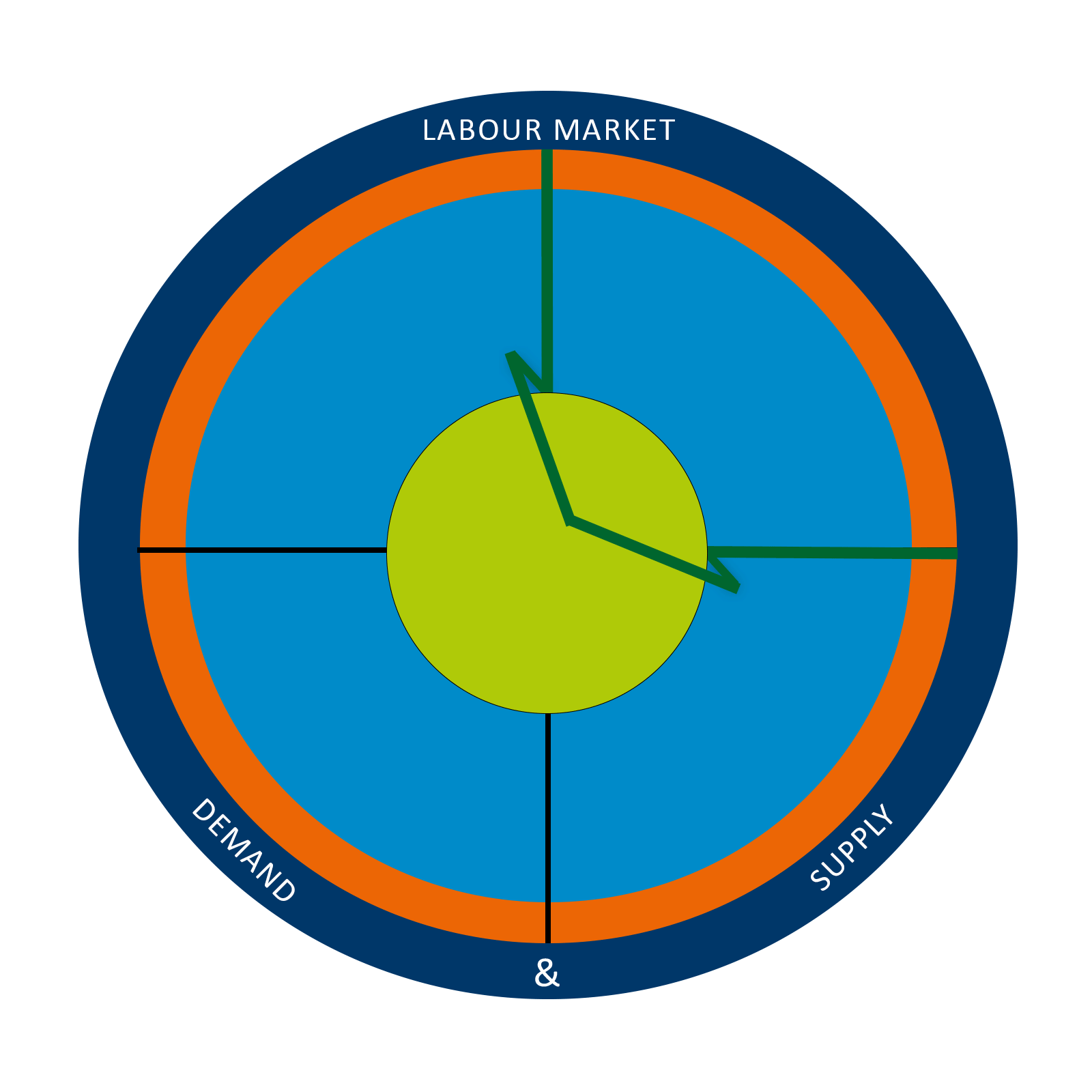- About us
- Inclusive organisation
- Methods & instruments
- Sharing Knowledge
- CONTACT
Inclusive Work Redesign (IWR) 2.0 is a methodical approach that enables organisations to bring the diverse talents of both people currently working and those searching for jobs to their full potential within the organisation, as well as to promote sustainable employability within meaningful jobs.
The model below outlines IWR 2.0’s basic principles and aims. Organisations are the central focus of the model, positioned in the labour market where supply and demand fluctuate. IWR 2.0 aims to reliably align supply and demand of personnel by organising work in such a way that it fits the (changing) capacities and ambitions of people who have or are searching for jobs.

Diagram 1. IWR 2.0 model
The green arrow in diagram 1 indicates the development or support path an organisation goes through in order to become more inclusive. This path starts with an conceptualisation phase, during which contextual aspects, such as an organisation’s personnel challenges, wishes and ambitions, are explored. This is followed by an exploration and analysis to map out the current situation and ideas and wishes regarding the desired outcome. Finally, participative redesign takes place, which consists of exploring how work may be organised differently for the sake of sustainable employability of both current and new employees. This final exploration happens in collaboration with employees of the department(s) involved.
The other parts of the diagram each tackle various principles concerned with the inclusion’s sustainability.
The IWR method may be used to help people who are unable to independently participate in the current labour market integrate in an organisation, as well as to help people who can no longer execute their previous job reintegrate. IWR 2.0 may also be used in a preventative manner, e.g., to prevent absenteeism due to high work pressure.
Aims of the IWR 2.0 model:
|
Joint letter to parliament regarding the approach to labour shortages(2022) (linked letter in Dutch): call for action: organise work differently `……‘There is an intrinsic value to making work more accessible for people currently on the side lines, beyond providing new opportunities to solve personnel shortages. Not all vacancies created by employers are suitable for the people who still don’t have jobs. This target group doesn’t always meet demands regarding education or experience, may need more support on the job, or can only perform some of the intended tasks. Employers can cut jobs or positions into different pieces, or otherwise adapt them, in order to have an easier time finding people (who wouldn’t fit in currently) to fill these vacancies. Using job carving and job crafting, employer services offer advice and help for free. The government, along with sector organisations and regional employer services, wants to stimulate employers to use these instruments more often. Employers may also combine working and learning by offering an apprenticeship, which offers a realistic chance of this work continuing after finishing the training.’……’ |
|
The IWR approach was specifically mentioned in a letter to the Parliament (linked letter in Dutch) by former Dutch State Secretary Van Ark (Social Affairs and Employment): …….`Interestingly, research shows that municipalities and employers often start from existing vacancies. Ideally, they should be willing to organise work differently. Organising work differently and changing your view on existing jobs creates new chances and opportunities. UWV [the Dutch Employee Insurance Agency] has an instrument with which to give out inclusive business advice [a method based on IWR]. Other parties may offer this service as well. I consider it an important instrument and would like to discuss with municipalities and UWV how they can further incorporate it into their regular service (including employers service)’……. . |